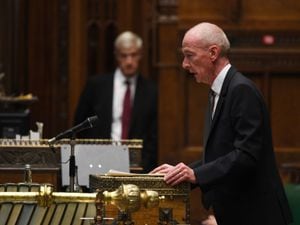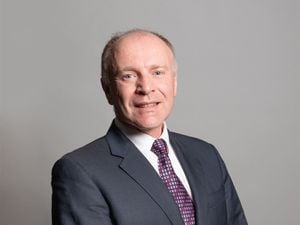Working people paying for Government's colossal money mismanagement, argues Pat McFadden
Working people are being asked to pay the cost of the Government's mistakes through tax rises after a "colossal mismanagement" over Covid-19 payments, an MP has said.

Labour's Pat McFadden, Shadow Chief Secretary to the Treasury, said HMRC's own figures had revealed grant losses due to fraud and error equated to £5.8 billion.
The amount expected to be recovered between 2021 and 2023 is £1.5bn, around a quarter of the total amount, leading to £4.3bn being written off by the Treasury.
Meanwhile a further £8.7bn of losses over PPE had been highlighted in a Government report, as the Wolverhampton MP hit out at "mismanagement" of the cash.
Mr McFadden said ministers had shown an "arrogance" over the money and said it was "cynical" to drive through tax increases when more families were under pressure.
The Labour MP cited Lord Agnew, former minister for efficiency and transformation, who resigned over the handling of fraudulent loans, during a debate in parliament.
"It matters now, because this is the time when the 100 per cent Government guarantee starts to kick in—that is, when the taxpayer starts having to pay the cost of the defaulted loans," the MP said.
He added: "Lord Agnew rightly made the link between the huge sums that we are discussing and tax, because the context of this debate is that in the year following those losses the Government will bring in a tax rise that will add hundreds of pounds a year to the average family’s tax bill and raise the overall tax burden to the highest levels since the 1950s.
"It does not matter how many times the Chancellor and the Prime Minister describe themselves as tax-cutting Thatcherites: between them, they have raised taxes far more than any Chancellor of either party since she left office. It is completely absurd for the Chancellor to stand up and give a tax-raising Budget and then try to wash his hands of it at the end.
"There is now a yawning gap between the rhetoric and the actual record of stewardship of public money. It smacks of a Government who have been in power for too long, and who have become complacent and, overall, arrogant—although I would never accuse the Minister of that, as I have enormous respect for him.
"There is an arrogance about the mismanagement of the money, and it is totally cynical to drive through tax increases when families are being squeezed by rocketing energy bills and declining real wages, just so the Chancellor can cut taxes before the next election. Taxes should be geared to the needs of the country, not the political campaign grid of the Conservative party."
The Wolverhampton South East MP said the £8.7bn highlighted in the Department of Health and Social Care's annual report, alongside the £4.3bn from Covid-19 loans, could have generated a year's worth of money set to be raised by the National Insurance increase in April this year.
He added Covid-19 loans had been made to more than 1,000 companies not trading when Covid-19 started and checks had only been introduced after 60 per cent of the loans had been issued.
"The Chancellor says those tax rises are all about public services, but it is impossible to escape the conclusion that they are, at least in part, to fill the hole caused by that colossal mismanagement of public money. Working people across the country are being asked to pay the cost of the Government’s mistakes," he added.
John Glen MP, Economic Secretary to the Treasury, said the Government had "sprang into action" to save the economy and had rapidly put forward more than £400bn in a package of support to protect jobs and businesses.
He added Covid support schemes had safeguarded millions of jobs and livelihoods throughout the country and the priority of the Government was to ensure people, and businesses, were swiftly supported.
Mr Glen added: "I have spoken to officials on several occasions over the last two years about what more could have been done at the inception of those schemes.
"The extra checks that we put in place as quickly as we could would have delayed the start of the schemes, which were already delayed because of the circumstances I explained earlier.
"It would have caused further delay—in some cases, not just weeks but months—and would have led to serious harm for many SMEs at a time of what we all acknowledge was acute crisis."





